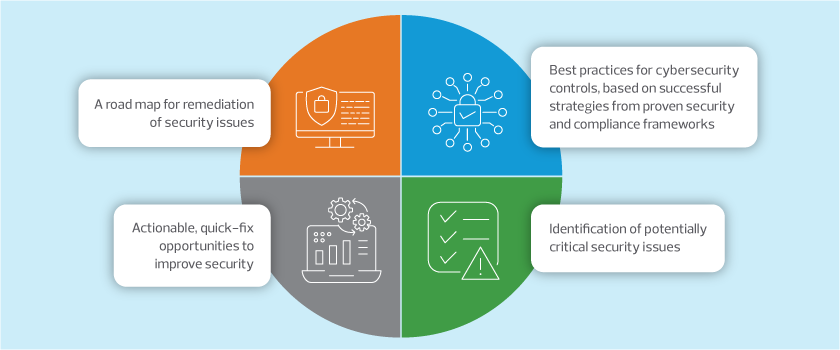A cyber risk assessment is a process used to identify, evaluate, and prioritize potential threats and vulnerabilities to an organization's information systems and data. Its purpose is to determine where security gaps may exist and to develop and implement strategies to reduce these risks, aiming to safeguard the organization from financial loss, operational disruption, or reputational impact resulting from cyberattacks.
Conducting a cyber risk assessment is important because it:
- Enhances security posture by identifying and addressing vulnerabilities before exploitation occurs.
- Assists organizations in allocating resources to address the most significant risks and critical assets, which can improve the effectiveness of security investments.
- Provides data for executives and stakeholders to make decisions regarding security investments and risk tolerance.
- Contributes information to the development of incident response and recovery plans by highlighting potential points of failure.
- Supports compliance with regulatory requirements and industry standards through a proactive approach to risk management.
The benefits of cyber risk assessment services include:
- Enhanced security posture: Proactively reinforces protections against cyber threats.
- Compliance: Facilitates adherence to regulatory and industry standards.
- Reduced financial loss: Minimizes exposure to the risks of data breaches and operational disruptions.
- Improved decision-making: Delivers actionable insights to support informed security strategies.
- Strategic planning: Establishes a framework for advancing organizational cybersecurity initiatives.
Cyber risk assessment services can encompass:
- Vulnerability detection: Specialists assess your IT environment to identify weaknesses in systems, applications, and networks.
- Threat analysis: Identifies potential cyber threats—such as ransomware, phishing, and insider risks—that may exploit identified vulnerabilities are recognized.
- Risk evaluation: The likelihood of threats being exploited and their potential impact on business operations and data is measured.
- Action plans: A prioritized list of recommended actions is developed based on the risk evaluation, following frameworks like NIST.
- Reporting and guidance: A comprehensive report on security posture is provided with practical recommendations for implementing necessary controls and best practices.
RSM’s customized cyber risk assessment determines your risk exposure, includes advice on potential process gaps and realistic action plans, and provides you with a high-level view of your organization’s cybersecurity maturity. Key RSM deliverables include:


